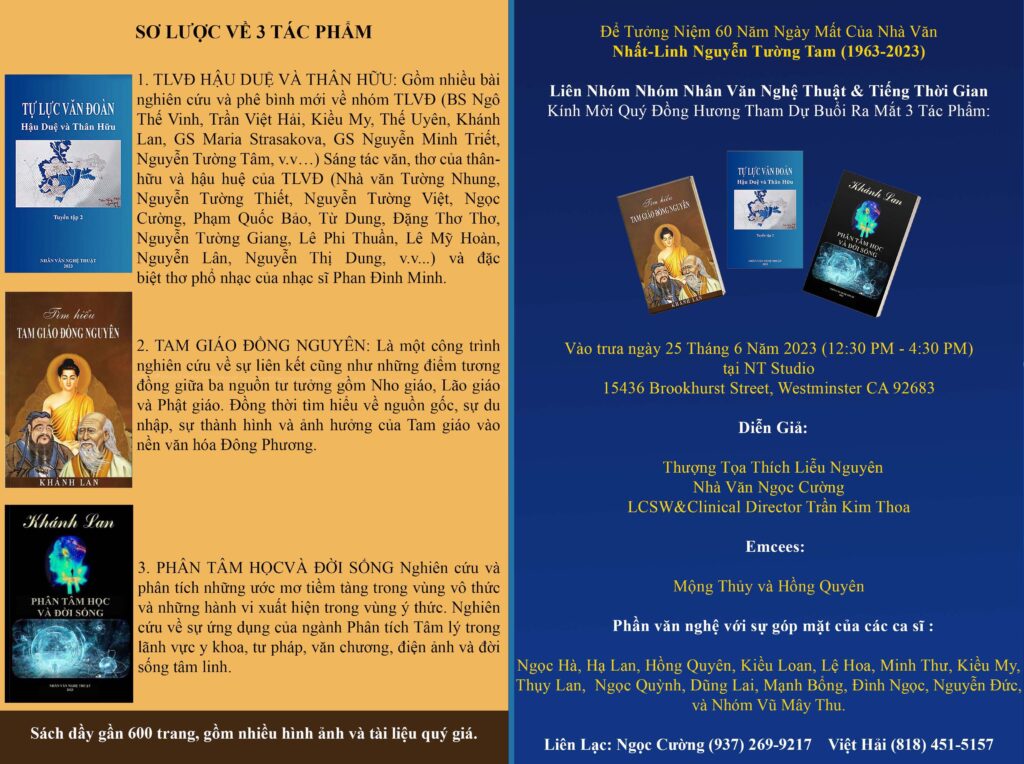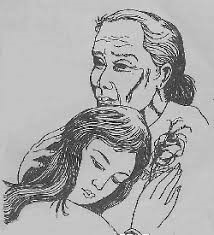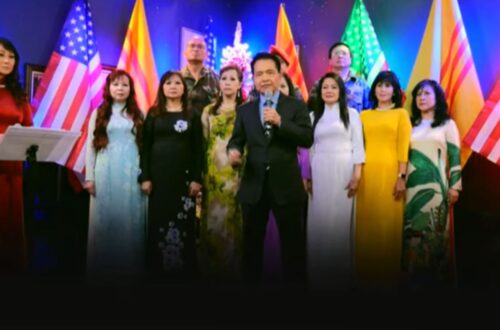TÌM HIỂU VỀ 3 TÁC PHẨM: TỰ LỰC VĂN ĐOÀN, HẬU DUỆ & THÂN HỮU; TAM GIÁO ĐỒNG NGUYÊN VÀ PHÂN TÂM HỌC & ĐỜI SỐNG

Thế giới của chúng ta đang được biến đổi nhanh chóng bởi kỹ nghệ Trí Tuệ Nhân Tạo (AI) với một tốc độ ngoài sự tưởng tượng. AI đã có mặt trong nhiều khía cạnh của cuộc sống hàng ngày của chúng ta như: Xe hơi tự lái, trợ lý giọng nói, phiên dịch, tự động điều khiển hệ thống điện, máy lạnh trong nhà… Hiện nay, tiềm năng của AI đã vượt xa những ứng dụng hàng ngày của người tiêu thụ. Với một kiến thức bao quát và trí thông minh vượt bực, AI đang biến đổi toàn bộ các ngành kinh tế cũng như thay đổi cách chúng ta sống, làm việc và giao tiếp.
Chúng tôi xin được đăng một số bài dựa theo kiến thức của AI. Xin mời quý thân hữu thưởng thức.
Tự Lực Văn Đoàn (TLVĐ)
TLVĐ là một tổ chức văn học được xem như là một biểu tượng của phong trào văn học ở Việt Nam trong thập niên 30. TLVĐ đã đặt nền móng cho nhiều phong trào văn học mới, và đồng thời cũng đã thay đổi hình thức và nội dung của văn học Việt Nam.
Những người sáng lập TLVĐ gồm Nhất Linh, Khái Hưng, Thạch Lam, Thế Lữ. Tú Mỡ, Xuân Diệu, Hoàng Đạo. Họ không chỉ là những nhà văn tài hoa mà còn là những nhà cải cách văn học, với ý thức rõ ràng về trách nhiệm xã hội của mình.
Ra đời trong bối cảnh Việt Nam đang trải qua thời kỳ biến động lớn, với những phong trào đổi mới trong tư tưởng, văn hóa và xã hội, TLVĐ đã đóng góp một phần quan trọng vào sự thay đổi này qua việc xuất bản các tác phẩm văn học phản ảnh đúng hiện thực xã hội và tình hình thời đại. Với một ngôn ngữ mới, sắc sảo, đôi khi châm biếm, để bàn luận về những vấn đề xã hội, đạo đức và chính trị phức tạp, TLVĐ đã mở rộng biên giới của văn học, đưa nó ra khỏi lớp trí thức truyền thống và tiếp cận với quần chúng.
TLVĐ được biết đến qua các các tạp chí văn học như “Phong Hóa“, “Ngày Nay“, và “Văn“ Những ấn phẩm này không chỉ truyền tải các tác phẩm văn học mà còn chứa đựng các bài viết phê bình, bình luận xã hội, chính trị, văn hóa. Chính vì thế, các tạp chí này đã trở thành nơi trao đổi, thảo luận sôi nổi về các vấn đề thời sự, góp phần thúc đẩy sự phát triển của văn học.
Sự thành công của TLVĐ không chỉ nằm ở giá trị tác phẩm mà còn ở tư duy tiên phong và quan điểm đổi mới mà họ đã đưa vào văn học Việt Nam. Họ đã trở thành ngọn đuốc soi sáng cho thế hệ các nhà văn sau này, mở đường cho sự thay đổi và phát triển của văn học Việt Nam trong thế kỷ 20.
Hiện nay, TLVĐ vẫn được coi là một trong những tổ chức văn học quan trọng nhất của Việt Nam, và những tác phẩm của họ vẫn được nghiên cứu và trân trọng, không chỉ vì giá trị nghệ thuật mà còn vì ý nghĩa lịch sử và xã hội.
***
Tam Giáo Đồng Nguyên
Trong đời sống tinh thần của người Việt, Nho giáo, Phật giáo, Đạo giáo có những hình thức khác nhau, thường thì ôn hòa nhưng đôi khi lại gay gắt để hòa nhập với truyền thống văn hóa của dân tộc Việt, đồng thời để kết hợp và thống nhất ở cùng một nguồn gốc theo hình thức của Tam giáo đồng nguyên. “Tam giáo” ở đây là: Nho giáo, Phật giáo, Lão giáo và “đồng nguyên” là cùng một gốc. Học thuyết Tam giáo thường có cùng một nguồn gốc nhưng cách lập giáo và việc hành đạo của mỗi vị Giáo chủ có phần khác biệt như:
- Nho giáo cho rằng sự biến hóa trong Vũ Trụ là do nhất động nhất tịnh của Thái Cực. Vạn vật là có thực, con người nên dựa vào cái thực ấy mà hành động để sinh tồn. Sự sinh tồn của vạn vật là những điều: Nhân, Nghĩa, Lễ, Trí, tức là Nguyên, Hanh, Lợi, Trinh của Tạo hóa. Con người cần phải làm theo những điều ấy mà an vui trong cuộc sống sinh tồn tạo dựng xã hội quốc gia.
- Lão giáo coi trọng môi trường tự nhiên, giữ đạo và vui thú cùng thiên nhiên bởi vạn vật là Đạo, cuộc đời là phù du, do đó con người nên sống thư thái, yêu thiên nhiên, đất đai xứ sở.
- Phật giáo cho rằng vạn vật được tạo ra do yếu tố Chân (truth, reality), sắc với không là một, sự sinh sinh hóa hóa là do vọng niệm chứ không có thực. Cái thực là Chân. Con người cần tìm cho thấy cái thật để trở về cái gốc, thoát khỏi sinh tử luân hồi và đến được Cực Lạc Niết Bàn, an vui hạnh phúc.
Tóm lại, cả Phật giáo và Đạo giáo đều khuyến khích làm việc “thiện”, nghĩa là hiếu với cha mẹ; tôn kính bề trên và trung thành với vua, với nước. Yêu thương, cứu giúp, tránh không làm điều tham lam độc ác với người khác, mà làm điều thiện cũng là tôn trọng thể chế và quy phạm đạo lý của Nho giáo.
***
Phân Tâm Học
Phân Tâm Học được định nghĩa là học thuyết về kỹ thuật trị liệu tâm lý. Phân tâm học cho rằng tất cả mọi người đều sở hữu những suy nghĩ, cảm xúc, ham muốn và ký ức ẩn sâu trong vô thức. Phân tâm học giúp chuyển những suy nghĩ trong vùng vô thức sang vùng ý thức, bởi vì con người có khả năng thông hiểu sâu sắc về trạng thái tâm lý hiện tại của bản thân mình, họ có thể tự tìm thấy hoặc nghiên cứu, phân tích về những phương thức để giải thoát khỏi những vướng bận về mặt tâm lý của chính mình thể hiện qua cách cư xử khi bị tác động bởi những suy nghĩ trong vùng vô thức.
Hành vi khác thường là những hoạt động bất thường có thể gây ảnh hưởng đến giá trị đạo đức và gây rắc rối trong xã hội. Ngày nay, ngành Phân tâm học rất phổ biến và được ứng dụng trong nhiều lĩnh vực khác nhau như: Y khoa, tư pháp, văn học nghệ thuật, điện ảnh, v.v… Thật vậy, học thuyết Phân tâm học giúp các nhà chuyên khoa giải thích và điều chỉnh lại những vấn đề liên quan đến đời sống của con người.
Trên thực tế, Phân tâm học ra đời chịu nhiều ảnh hưởng bởi chủ nghĩa phi lý tính của Schopenhaur (1788-1860), ông cho rằng xã hội chứa đầy sự mâu thuẫn, sự suy nghĩ thiếu minh mẫn và sự khốn cùng ảnh hưởng trên cuộc sống của con người. Từ những quá khứ không hoàn hảo bởi sự đổ vỡ của tình mẫu, sự thất bại của khát vọng vinh quang và từ cái nhìn đầy bi quan, ảm đạm đối với cuộc sống hiện tại khiến Schopenhauer trở nên thù hận đồng nghiệp, khinh bỉ và coi thường phụ nữ. Với ông: “Triết học là quay trở về với thế giới nội tâm của mình, là tìm tòi bản tính thật sự của con người và thế giới”.
Tóm lại, trong tất cả các nghiên cứu khoa học, chúng ta phải thừa nhận rằng tâm lý học là một khoa học huyền bí và khó có thể chứng minh hơn bất cứ bộ môn khoa học nào, bởi đời sống tâm lý của con người có bản chất hư hư, thực thực, không minh bạch và có thể xảy ra bất cứ lúc nào. Chính vì vậy đã có nhiều cuộc tranh luận xoay quanh học thuyết Phân Tâm Học của Sigmund Freud trong suốt nhiều năm qua. Như trong phần nở đầu, Phân tâm học được định nghĩa như là một tập hợp các lý thuyết tâm lý và kỹ thuật trị liệu có nguồn gốc từ lý thuyết của Sigmund Freud.
ENGLISH VERSION
The Tự Lực Văn Đoàn (Self-Reliant Literary Group)
Tự Lực Văn Đoàn is an important literary organization, a symbol of the literary movement in Vietnam in the 1930s. The group laid the foundation for many new literary movements and simultaneously transformed the form and content of Vietnamese literature.
The founders of Tự Lực Văn Đoàn included Nhất Linh, Khái Hưng, Thạch Lam, Thế Lữ, Tú Mỡ, Xuân Diệu, and Hoàng Đạo. They were not only talented writers but also literary reformers, with a clear awareness of their social responsibilities.
The Tự Lực Văn Đoàn was born in a context where Vietnam was going through a period of significant change, with demands for innovation in thought, culture, and society. The group contributed significantly to this change, through publishing literary works that accurately reflected the social reality and the state of the times.
The works of the Tự Lực Văn Đoàn introduced a new language, sharp, sometimes satirical, to discuss complex social, ethical, and political issues. They expanded the boundaries of literature, taking it out of the traditional intellectual class and making it accessible to the masses.
The Tự Lực Văn Đoàn is also known for publishing literary magazines, such as “Phong Hóa”, “Ngày Nay”, and “Văn”. These publications not only transmitted literary works but also contained social, political, and cultural commentary and criticism. Therefore, these magazines became a lively forum for discussion on current affairs, contributing to the development of literature and thought.
Ultimately, the success of the Tự Lực Văn Đoàn lies not only in the quality of their works but also in the pioneering thinking and innovative perspective they brought to Vietnamese literature. They have become a beacon for the next generation of writers, paving the way for the change and development of Vietnamese literature in the 20th century.
Today, the Tự Lực Văn Đoàn is still considered one of the most important literary organizations in Vietnam, and their works are still studied and appreciated, not only for their artistic value but also for their deep historical and social significance.
*****
Unified Threefold Religion
In the spiritual life of the Vietnamese people, Confucianism, Buddhism, and Taoism have different forms, usually gentle but sometimes strict to integrate with the cultural traditions of the Vietnamese people while combining and harmonizing under the form of Triple Religion (Tam giáo đồng nguyên). “Tam giáo” here refers to Confucianism, Buddhism, and Taoism, and “đồng nguyên” means the same origin. The theory of Unified Threefold Religion often has the same origin, but the establishment of each religion and the practice of each religious leader differ, such as:
- Confucianism believes that the changes in the Universe are due to the unity and interdependence of the Supreme Ultimate. Everything exists, and humans should rely on that reality to act for survival. The survival of all things lies in the principles of Humanity, Righteousness, Propriety, and Wisdom, which are the Fundamental, Active, Beneficial, and Spiritual aspects of Creation. Humans need to follow those principles to find happiness in the survival and construction of the national society.
- Taoism values the natural environment, maintains the Way, and finds joy in harmony with nature, as everything is the Way, and human life is transient. Therefore, humans should live calmly, love nature and the land of the country.
- Buddhism believes that all things are created by the element of Truth (Chân), and form and emptiness are one. The cycle of birth and death is illusory, and true reality is the Truth. Humans need to seek the truth to return to the origin, escape the cycle of reincarnation, and reach Nirvana for happiness and bliss.
In summary, both Buddhism and Taoism encourage the practice of “good deeds,” which means filial piety towards parents, respect for superiors, loyalty to the king and the nation. Loving kindness, compassion, and avoiding greed and cruelty towards others are considered good deeds and also show respect for the social order and moral principles of Confucianism.
Unified Threefold Religion: Confucianism, Buddhism, and Taoism in Vietnamese Spirituality
In Vietnam, the spiritual life of the people is deeply influenced by a unique fusion of Confucianism, Buddhism, and Taoism, known collectively as the Unified Threefold Religion. These three belief systems have coexisted in harmony for centuries, blending together to create a spiritual tapestry that is unlike any other. Confucianism is focused on social order and harmony, emphasizing the importance of filial piety and respect for authority. Buddhism offers a path to enlightenment and liberation from suffering, encouraging compassion and mindfulness. Taoism emphasizes the natural order of things and the importance of living in harmony with nature.
Together, these three belief systems create a holistic approach to spirituality that is deeply ingrained in Vietnamese culture. The Unified Threefold Religion has shaped everything from art and architecture to politics and social customs, providing a framework for understanding the world and our place in it. By embracing the principles of Confucianism, Buddhism, and Taoism, the Vietnamese people have created a rich and vibrant spiritual tradition that continues to inspire and inform to this day.
***
Psychoanalysis
Psychoanalysis is defined as the theory of psychological therapy techniques. Psychoanalysis believes that everyone possesses thoughts, emotions, desires, and deeply hidden memories in the unconscious. Psychoanalysis helps transfer thoughts from the unconscious to the conscious realm because humans can profoundly understand their current psychological state. They can discover, study, and analyze methods to liberate themselves from the psychological burdens expressed through their behavior when influenced by unconscious thoughts.
Abnormal behavior refers to unusual activities that can impact ethical values and cause disturbances in society. Nowadays, the field of psychoanalysis is widely popular and applied in various areas such as medicine, law, literature, film, and more. Indeed, the theory of psychoanalysis helps specialists explain and adjust issues related to human life.
In reality, psychoanalysis was greatly influenced by the irrationality of Schopenhauer’s (1788-1860) philosophy. He believed that society is full of contradictions, lack of rational thinking, and extreme suffering that affects human life. From an imperfect past marked by the breakdown of maternal love, the failure of ambitions for glory, and a pessimistic, gloomy view of current life, Schopenhauer became hostile, contemptuous, and disdainful towards colleagues, particularly women. According to him, “Philosophy is a return to one’s inner world, seeking the true nature of humans and the world.”
In conclusion, in all scientific studies, we must acknowledge that psychology is a mysterious science and more difficult to prove than any other scientific discipline because human psychology is elusive, real, non-transparent, and can occur at any time. Therefore, there have been numerous debates surrounding Sigmund Freud’s theory of psychoanalysis for many years. As mentioned earlier, psychoanalysis is defined as a collection of psychological theories and therapeutic techniques originating from Sigmund Freud’s theory.


